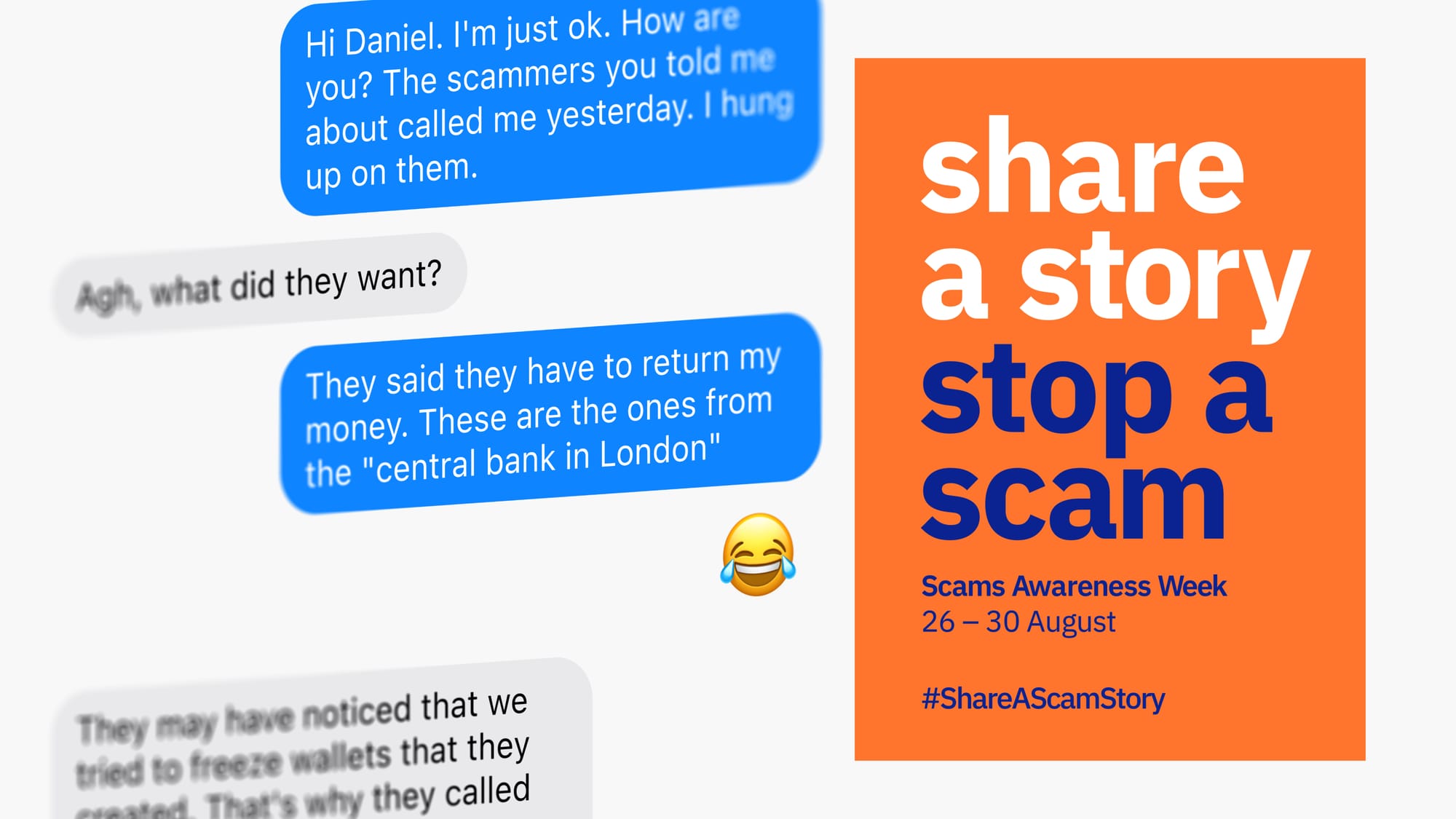New Crypto Scams to be Aware of in 2024

Crypto scams happen every day as scammers get more sophisticated in their methods. A common scam that is rising in prominence is the "recovery scam" whereby the scammer poses as someone who will assist you to get your stolen funds back.
CoinJar is participating in Scams Awareness Week 2024, and as part of that, we are highlighting examples of how scams unfold, and what to look out for.
This is the story of Emma, who thought she was getting help to recover her lost cryptocurrency.
The Contact
Emma had just lost a lot of money in an investment scam. She was desperate for help. Then, she got an email from Daniel. Daniel said he worked for a service that helps people get their money back. Emma was worried, but she really wanted to believe someone could help her. She decided to trust Daniel, hoping he could solve her problem. Daniel gave Emma his personal phone number so they could keep in touch about the recovery process.

The Kindness
Daniel kept talking to Emma, and he seemed friendly and helpful. He told her not to worry and that her case wasn’t unusual. He even said he had helped others like her before.
Daniel told Emma to do some things that seemed normal. He asked her to check her accounts, send small amounts of cryptocurrency to a “safe” wallet, and follow his instructions carefully. Emma started to trust Daniel more and more, especially because he was always there to answer her questions.
“Everything is going well,” Daniel told her. “Just ignore any other calls you get from fake officials. They’re trying to trick you.”
Emma began to feel more comfortable.

The Trap
But as time passed, she noticed it was taking longer than she thought. Daniel always had a reason for the delays, and Emma kept trusting him, hoping she’d get her money back soon.

The Doubt
Weeks went by, and Emma started to feel uneasy. The delays kept coming, and Daniel’s explanations didn’t make sense anymore. She began to feel scared and frustrated.
"I’m so scared I’ve lost everything. I’m terrified," Emma admitted in a message. "This feels too good to be true."
Daniel tried to calm her down, but he also started asking for more money to “finish the process.” This made Emma even more suspicious.
The Truth
Eventually, Daniel stopped replying to Emma. She realised that despite all the promises, nothing was really happening. This was the moment Emma realised she was being scammed. She felt betrayed. The person she thought was helping her was actually the one stealing from her.
Emma understood then that Daniel had never intended to help her. He had been lying the whole time, taking advantage of her trust and desperation.

Conclusion
Emma’s story shows that anyone can fall victim to a scam. It’s important to be vigilant and aware of scams no matter what you do. Scammers like Daniel use tricks to gain your trust and take your money.
If you’re dealing with cryptocurrency, always check who you’re talking to. Don’t trust anyone who asks for money to help you, and if something doesn’t feel right, listen to your gut.
Emma’s story can help others avoid the same trap. Be careful, stay alert, and protect yourself from scams.
Help fight scams
You can help to fight scams by reporting them to the National Anti-Scam Centre via Scamwatch.gov.au/report-a-scam. Your reports are crucial—they help disrupt scammers, protect others, and prevent financial losses.
Currently, 30% of serious scams are unreported. Reporting can be done anonymously or on behalf of someone else, and with your consent, information can be shared with relevant authorities to further combat scams. You can also report directly to the police at cyber.gov.au/report. Reporting makes a difference.
Share your story
We're encouraging all Australians to speak up, share and report scams.
Sharing your story helps others to spot, avoid and report scams, and recover from the harms caused by scammers.
Share your scam story using the hashtag #ShareAScamStory to help make Australia a harder target for scammers.
FAQs
I got scammed out of my crypto. Now someone's offering to help me get it back, but they want me to pay them. Is this legitimate?
Absolutely not. This is a recovery scam, another layer of fraud targeting victims who are already vulnerable. Never pay anyone upfront who claims they can recover your lost funds.
How does the recovery scam work?
The scammer contacts you, often posing as a government agency, law enforcement, or a financial institution. They promise to help recover your stolen crypto, but first, they need your personal information, bank account details, or upfront payment for their "services." It's all a trick to steal even more money from you.
What are some common types of scams that lead to recovery scams?
Initial scams might include investment scams (promising high returns on crypto investments), romance scams (building trust to then ask for crypto), or phishing scams (tricking you into clicking on a link or giving away your personal details). Once you've lost money, recovery scammers swoop in.
How can I protect myself from recovery scams?
Be skeptical: If it sounds too good to be true, it probably is.
Never share personal information: Don't give out your bank account, social security number, or other sensitive data to anyone you don't completely trust.
Don't pay upfront fees: Legitimate organizations won't ask for payment before providing services.
Report scams: If you've been targeted by a recovery scam or any other fraud, report it to your local law enforcement.
What are some red flags that someone might be a recovery scammer?
Unsolicited contact: They reach out to you first, often via text message or phone call.
Pressure tactics: They create a sense of urgency, pushing you to act quickly.
Requests for payment: They ask for upfront fees or want your bank account information.
Promises of guaranteed recovery: No one can guarantee they'll recover your lost crypto.
What should I do if I think I've been targeted by a recovery scam?
Cease all communication with the scammer immediately. Do not provide them with any personal information or money. Report the scam to the authorities.
Remember: Scammers are constantly evolving their tactics. Always be vigilant and protect yourself from fraud. If you're unsure about anything, seek advice from a trusted source before taking any action.
Are there any legitimate ways to recover stolen crypto?
Unfortunately, recovering stolen crypto is extremely difficult. If you've been scammed, report the incident to the authorities and your crypto exchange or wallet provider. They may be able to assist, but there's no guarantee of recovery.
How do scammers get my phone number or personal information?
Scammers use various tactics to obtain your information. They might buy data from the dark web, trick you into providing it through phishing scams, or gather it from social media and other online sources. Always be cautious about who you share your information with.
Can I trust someone who claims to be from a government agency or law enforcement?
Be very wary. Scammers often impersonate officials to gain your trust. Verify their identity independently before sharing any personal information or taking any action. Legitimate agencies won't ask for payment or sensitive data over the phone or via email.
CoinJar Team
UK residents: Don’t invest unless you’re prepared to lose all the money you invest. This is a high‑risk investment and you should not expect to be protected if something goes wrong. Take 2 minutes to learn more: www.coinjar.com/uk/risk-summary.
Cryptoassets traded on CoinJar UK Limited are largely unregulated in the UK, and you are unable to access the Financial Service Compensation Scheme or the Financial Ombudsman Service. We use third party banking, safekeeping and payment providers, and the failure of any of these providers could also lead to a loss of your assets. We recommend you obtain financial advice before making a decision to use your credit card to purchase cryptoassets or to invest in cryptoassets. Capital Gains Tax may be payable on profits.
CoinJar’s digital currency exchange services are operated in the UK by CoinJar UK Limited (company number 8905988), registered by the Financial Conduct Authority as a Cryptoasset Exchange Provider and Custodian Wallet Provider in the United Kingdom under the Money Laundering, Terrorist Financing and Transfer of Funds (Information on the Payer) Regulations 2017, as amended (Firm Reference No. 928767).
Standard Risk Statement
The above article is not to be read as investment, legal or tax advice and it takes no account of particular personal or market circumstances; all readers should seek independent investment advice before investing in cryptocurrencies. The article is provided for general information and educational purposes only, no responsibility or liability is accepted for any errors of fact or omission expressed therein. Past performance is not a reliable indicator of future results.
Cryptocurrency is currently not regulated in the UK. It's vital to understand that once your money is in the crypto ecosystem, there are no rules to protect it, unlike with regular investments. You should not expect to be protected if something goes wrong. So, if you make any crypto-related investments, you’re unlikely to have recourse to the Financial Services Compensation Scheme (FSCS) or the Financial Ombudsman Service (FOS) if something goes wrong.

